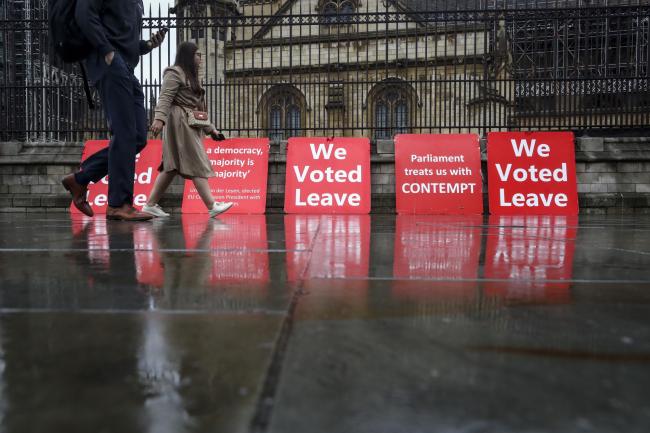(Bloomberg) -- The U.K. government plans to present detailed proposals to break the Brexit deadlock with the European Union after a Conservative Party conference next week, people familiar with the matter said.
The plan would set out solutions for the post-Brexit border between Northern Ireland and the Irish Republic, a dispute that has dogged divorce talks for almost two years and delayed the U.K.’s departure from the EU.
It’s a sign that while the two sides remain far apart, the looming Oct. 31 deadline for Britain to leave the bloc and EU reluctance to see Brexit drag on may be focusing negotiators’ minds.
EU officials have acknowledged in private that movement in the talks is unlikely before the meeting of Conservative grass-roots members in Manchester, which ends Oct. 2. Prime Minister Boris Johnson’s government is preparing to send the proposal in time for other EU governments can scrutinize it before leaders meet for a summit in Brussels on Oct. 17-18, the people said.
The prime minister is vowing to take the U.K. out of the EU on Oct. 31 whether he gets an amended divorce deal or not, even though Parliament passed a law forcing him to request a Brexit delay if there’s no deal.
Leaders from the 27 remaining EU countries believe it would be disastrous if the proposals came so late they would have to do more than tie up loose ends at the summit, so they want to see the U.K.’s plan in a matter of days.
EU’s Patience
More than three years after Britons voted to leave the EU, Johnson also faces a serious risk that the EU’s patience has run out.
Any U.K. request for another exit delay would be likely to require strong justification, such as an early election to resolve the political impasse over Brexit, and a sense from the U.K. government that it could use the extra time to craft a majority in Parliament for a divorce deal.
Chief Brexit negotiator Michel Barnier said there’s no need for further EU efforts to prepare for a no-deal Brexit because “the EU has already finalized its work.” In a letter this week to his U.K. counterpart, Brexit Secretary Stephen Barclay, Barnier reiterated that the deal that’s on the table “is the best way to protect citizens and businesses.”
Johnson has said he wants to replace the proposed Irish “backstop,” which aims to avoid a hard border, with an alternative set of arrangements. EU and U.K. negotiators agreed on the plan almost a year ago, only to see Parliament in London reject it.
As drafted, the backstop would keep the entire U.K. tied into the EU’s customs union and some single-market rules until the two sides come up with a better way of keeping the Irish border free of infrastructure and checks. Johnson says that’s unacceptable and has put forward ideas for carrying out checks and making customs declarations away from the border, and for using so-called trusted-trader systems and technology.
